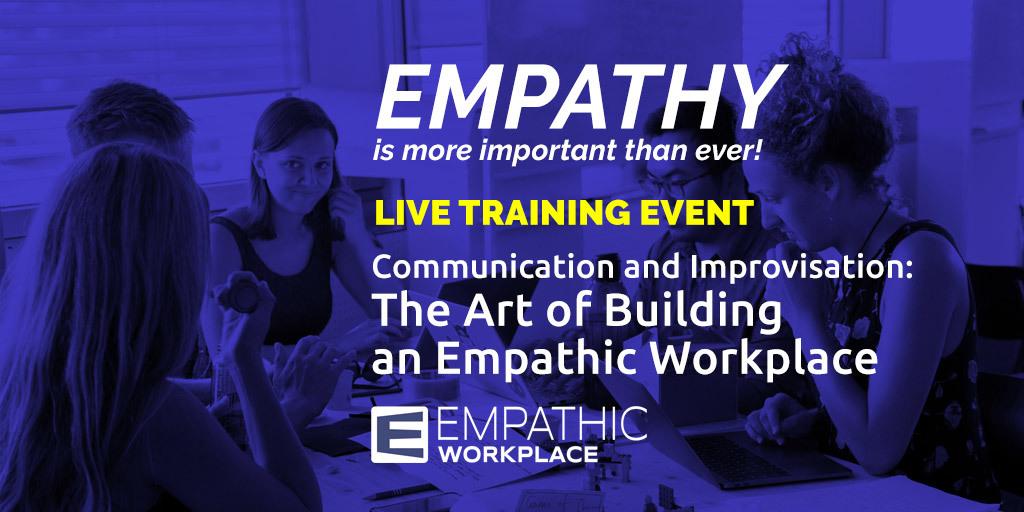
Empathic Workplace and Improv Therapy Group present
A full-day workshop, lecture and demonstration on
The Art of Building an Empathic Workplace.
October 27, 2018
9:00 AM to 3:00PM
Orrington Hotel, Evanston, IL
9:00 AM to 3:00PM
Orrington Hotel, Evanston, IL
E X P L O R E
The Empathic Workplace
Emotional Intelligence
Connecting Authentically
Storytelling and Empathy
“The way you helped us feel empathic communication in a fun, personal way really helped our team greatly”
Roger Sanchez, VP Manufacturing
Attendees will gain valuable knowledge of the foundational principles that build an empathic workplace.
Attendees will hear engaging talks on topics related to empathy. The presentations are rooted in the expert knowledge born from decades of workplace interviews and investigations by Angela Nino, CFI (Certified Forensic Interviewer), President of Empathic Workplace. The materials and curriculum offer both general principles and implementation strategies.
The Empathic Workplace approach also embeds the techniques of improvisational training. The activities were developed by Lisa Bany, a veteran instructor at The Second City in Chicago and Founding Director at the Improv Therapy Group. The program we will present engages participants in interactive practice exercises that demonstrate the principles of empathy in a fun and unique manner.
The learning modules included in the workshop offer a menu of nuanced opportunities to advance the principles of cultivating and sustaining an empathic workplace.
Featuring:
Five Learning Modules
Featuring:
Five Learning Modules
FEELING IT:
Emotional Intelligence
Emotional Intelligence
Principles
We are often hard pressed to be sure that the emotion we are expressing is the emotion actually being received. We discuss the gamut of emotions and how facial expressions, body language and physical presentation portray more than we appreciate.
An important skill learned is how to take accountability for one's physical actions and owning their corresponding emotional projections. One must understand their role in a situation be it positive or negative.
Practice
Through group exercises the participants will practice changing their words and body language. Groups interact and learn the importance of empathic posture, and the obstacles that judgement creates. The group debriefs after the exercise.
PRACTICING IT:
Connecting Authentically
Connecting Authentically
Principles
In order to have others feel comfortable being honest and open with us requires an authentic, mindful connection. This module concentrates on learning to build rapport, how to actively listen and be present in the moment.
The first few moments of an interaction are always critical. How we initiate a difficult conversation or workplace interview sets the tone for honesty and empathy, or it does the exact opposite. One must of course then sustain authentic connection throughout the remainder of a conversation or investigation.
Practice
Using movement exercises participants will learn to be purposeful and connected to increase understanding of another's emotions and expressions. They will learn that these techniques will help build authentic connection within seconds of an interaction.
RELATING IT:
Storytelling and Empathy
Storytelling and Empathy
Principles
Demonstrating empathy is the most important building block for workplace investigations and difficult conversations. In order to connect authentically we tell relatable stories grounded in truth, while mindfully balancing boundaries and appropriateness.
This module explores how to authentically present and share our own experiences through the art of storytelling. This technique has proven to be Empathic Workplace's most effective tool for achieving cooperation in workplace investigations and difficult conversations.
Practice
Through improv exercises participants become more skilled at telling their stories in a way that connects with others. We learn to tell a story that connects the emotion and motivation, not the actions of another.
WORKING IT:
Navigating Workplace Conflict
Navigating Workplace Conflict
Principles
Arguments, complaints, harassments and accusations.... oh my. Misunderstandings are detrimental to morale and cognitive energy and by engaging in empathic communications a path forward is presented.
Learning to recognize what was really said versus what was heard, understanding each party's intentions, eliminating assumptions, being mindful of our own perceptions and biases - these are the building blocks to navigating conflict in an empathic workplace.
Practice
These exercises provide low stakes options to explore responses in high stakes conversations. Improvisation offers a forum to experience how situations could play out, and discover how this impacts our response and theirs.
LIVING IT:
The Empathic Workplace
The Empathic Workplace
Principles
How does everyone go back to work and get along after a workplace conflict, interview or difficult conversation? The aftermath of a workplace investigation, for example, can be difficult to navigate. Since there is no easy way to work in teams where individuals are distrustful of one another, best practice is to use the foundational building blocks of an empathic workplace.
An empathic workplace makes empathy, authenticity, and connection the priorities. This is not a one time workout, but a systemic commitment to a routine that embraces authentic communication. This module presents a how-to guide for reasonably addressing the concerns of all parties, accounting for our own contributions and creating a plan to move forward as a culturally empathic workplace.
Practice
The keystone of improvisation is the concept of "Yes, And" to acknowledge the reality of others, let ideas be heard, validate all parties involved, and move forward with support. These exercises reinforce all the lessons of the collaboration of a harmonious ensemble and empathic workplace.


